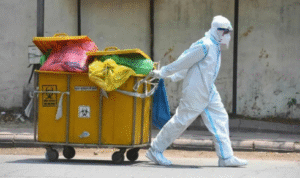
Medical waste disposal is one of the most important tasks in modern healthcare. Every hospital, clinic, dental office, and even small medical practice produces materials that can be hazardous if not managed properly. Used syringes, contaminated gloves, laboratory samples, and surgical byproducts are just a few examples of medical waste that must be handled safely.
In cities like Houston, where healthcare facilities are expanding quickly, the need for medical waste disposal services is high. Companies like MedCycle offer specialized solutions to help these facilities comply with regulations, protect their staff, and ensure public health.
Why Medical Waste Disposal Is Essential
Improper disposal of medical waste can lead to serious dangers. Medical waste often contains infectious materials, sharp objects, chemicals, and pharmaceuticals that can spread diseases or harm the environment. Without proper disposal practices:
- Patients and staff could be exposed to infectious diseases.
- Communities might face contamination of water, soil, and air.
- Healthcare facilities risk facing fines, lawsuits, and damage to their reputation.
This is why professional biohazard waste services exist. They ensure that every step, from collection to disposal, meets strict safety and compliance guidelines.
The Different Types of Medical Waste
Medical waste does not fit into a single category. It can be divided into several types, each requiring different handling and disposal methods.
- Infectious Waste
Items contaminated with blood or other body fluids, such as bandages, surgical gowns, or swabs.
- Sharps Waste
Needles, syringes, scalpels, and other sharp tools that can puncture skin. These need secure, puncture-proof containers.
- Pathological Waste
Human tissues, organs, and body parts removed during surgeries or autopsies.
- Chemical Waste
Laboratory chemicals, disinfectants, and solvents that can be toxic or corrosive.
- Pharmaceutical Waste
Expired or unused medications that should not be flushed or thrown away in regular trash.
- Radioactive Waste
Waste from nuclear medicine or radiology treatments.
Each category must be managed according to federal and state regulations, making professional medical waste disposal services essential for healthcare providers.
Medical Waste Disposal in Houston
Houston hosts one of the largest medical centers worldwide. With numerous hospitals, private practices, research labs, and urgent care facilities, the need for medical waste disposal services is constant.
Companies like MedCycle offer tailored solutions for:
- Hospitals and Clinics: High-volume waste management with scheduled pickups.
- Dental Offices: Safe disposal of sharps, amalgam, and contaminated items.
- Laboratories: Proper handling of chemicals, cultures, and research materials.
- Veterinary Clinics: Disposal of animal-related medical and surgical waste.
- Urgent Care Centers: Flexible pickup schedules to match varying waste volumes.
Houston healthcare providers must follow strict state and federal regulations, including guidelines from OSHA (Occupational Safety and Health Administration), DOT (Department of Transportation), and EPA (Environmental Protection Agency). Partnering with a professional ensures compliance and peace of mind.
The Role of Biohazard Waste Services
Biohazard waste, often called “red bag waste,” includes any material contaminated with potentially infectious agents. Professional biohazard waste services guarantee these materials are:
- Collected safely in color-coded bags and containers.
- Transported securely using licensed vehicles and trained staff.
- Treated properly through methods like autoclaving or incineration.
- Disposed of responsibly in accordance with all regulations.
This process protects healthcare workers, waste handlers, and the public from diseases such as hepatitis, HIV, and other dangerous pathogens.
Step-by-Step: How Medical Waste Disposal Works
To see why outsourcing to a professional service is vital, here’s how the process typically works:
- Step 1: Segregation at the Source
Medical staff separate waste into categories (sharps, infectious, chemical, etc.) right after use. - Step 2: Secure Storage
Waste goes into designated containers (red bags, sharps containers, chemical drums) to prevent leaks or injuries. - Step 3: Collection and Transportation
Licensed waste management companies schedule pickups and transport waste in specialized vehicles designed for biohazard safety. - Step 4: Treatment
Depending on the type of waste, it is sterilized through autoclaving, incineration, or chemical treatment. - Step 5: Final Disposal
After treatment, the waste is made harmless and disposed of in approved facilities, reducing environmental impact.
Benefits of Professional Medical Waste Disposal
Partnering with a certified company offers significant advantages to healthcare providers:
- Regulatory Compliance: Remain compliant with OSHA, EPA, and state laws.
- Infection Control: Protect staff, patients, and visitors from cross-contamination.
- Cost Efficiency: Avoid fines and streamline waste management.
Environmental Protection: Ensure eco-friendly disposal that reduces landfill waste. - Peace of Mind: Trust professionals to manage risks while healthcare workers focus on patient care.
The Houston Advantage: Local Medical Waste Disposal
Choosing a local Houston provider offers extra benefits:
- Faster Response Times: Flexible pickups based on facility needs.
- Personalized Service: Local providers understand the unique challenges of Houston healthcare.
- Community Impact: Supporting local businesses builds trust and relationships in the community.
How MedCycle Leads in Medical Waste Disposal
MedCycle specializes in medical waste disposal services trusted by Houston facilities. By combining compliance expertise, cost-effective solutions, and eco-friendly practices, MedCycle provides:
- Flexible pickup schedules
- Transparent pricing with no hidden fees
- Compliance documentation
- Customized solutions for facilities of all sizes
- A commitment to safety, sustainability, and client satisfaction
Healthcare providers looking for reliable biohazard waste services can count on MedCycle for safe and efficient waste management.
Frequently Asked Questions (Q&A)
What is medical waste disposal?
Medical waste disposal is the process of safely collecting, transporting, treating, and discarding waste generated by healthcare facilities to prevent risks to people and the environment.
Why is professional medical waste disposal important?
Improper disposal can spread diseases, cause injuries, and lead to legal fines. Professional services ensure compliance and safety.
How is medical waste disposed of in Houston?
Most medical waste disposal companies in Houston use autoclaving (steam sterilization), incineration, or chemical treatments before final disposal.
What are biohazard waste services?
Biohazard waste services manage infectious waste such as blood-soaked materials, sharps, and contaminated supplies, ensuring they are sterilized and safely discarded.
Does every healthcare facility need medical waste disposal services?
Yes. Whether it’s a large hospital or a small dental office, all facilities that generate medical waste must follow strict disposal regulations.
How do I choose the right medical waste disposal company in Houston?
Look for licensed providers that offer transparent pricing, provide compliance documentation, and have a good reputation in the local healthcare community.
Final Thoughts
Medical waste disposal is not just a requirement; it’s a responsibility. In Houston and beyond, healthcare providers rely on professional partners like MedCycle to keep their facilities safe, compliant, and environmentally responsible. By investing in reliable biohazard waste services, clinics and hospitals protect their staff, patients, and the communities they serve.

